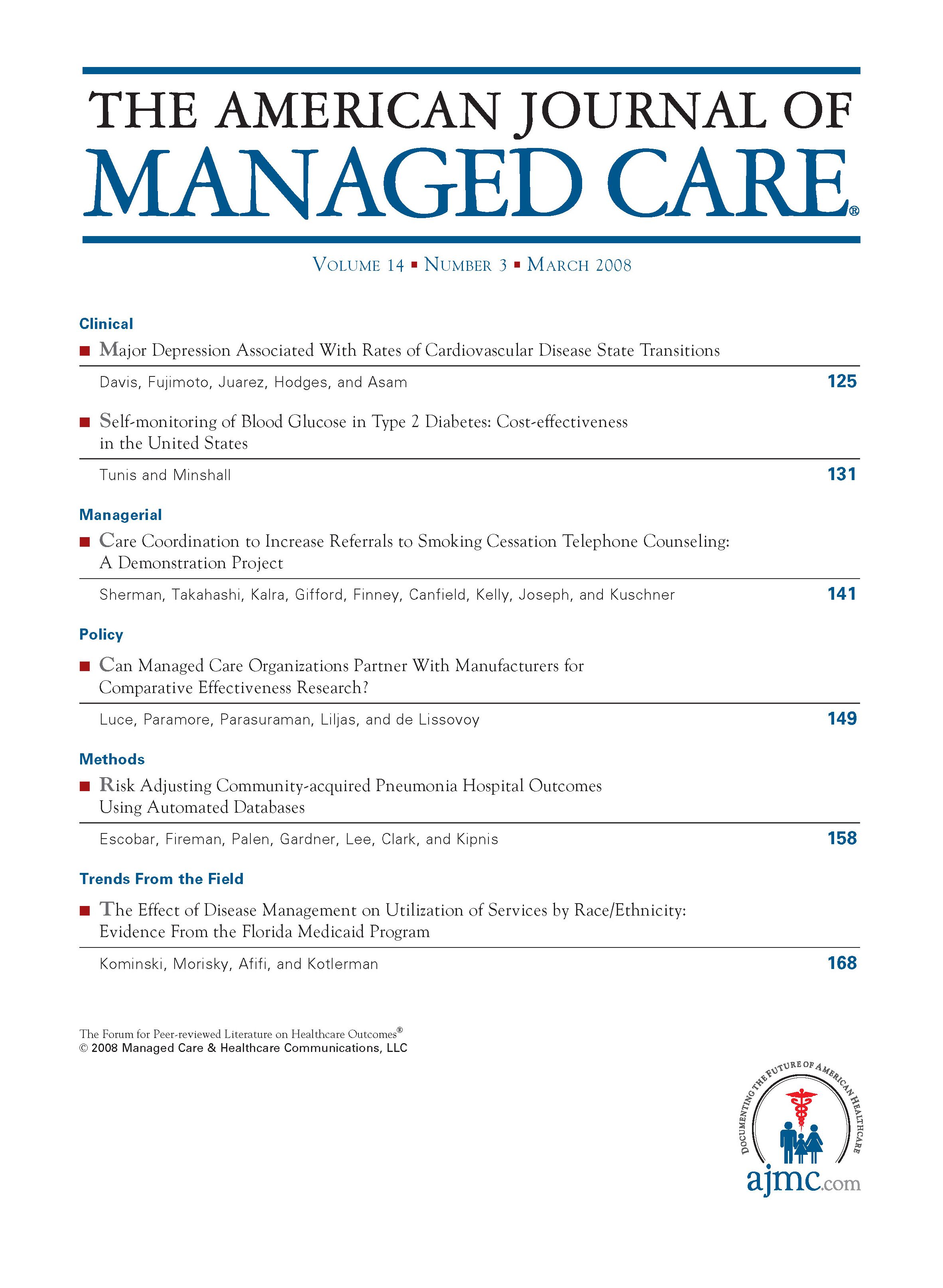- Center on Health Equity & Access
- Clinical
- Health Care Cost
- Health Care Delivery
- Insurance
- Policy
- Technology
- Value-Based Care
Correspondence regarding, "Cost Effectiveness of Thromboprophylaxis With a Low-Molecular-Weight Heparin Versus Unfractionated Heparin in Acutely Ill Medical Inpatients"
TO THE EDITORS
McGarry and colleagues did an excellent job in providing an economic perspective on the effectiveness of thromboprophylaxis with a low-molecular-weight heparin versus unfractionated heparin in acutely ill medical inpatients.1 Low molecular weight heparins (LMWHs) have gained wider acceptance as the drugs of choice in prophylaxis of venous thromboembolism (VTE) due to their superior efficacy and cost effectiveness to unfractionated heparin, and the reduced risk of heparin-induced thrombocytopenia and osteoporosis.1
However, new developments in the realm of VTE prophylaxis in medically ill patients have provided us some valuable insights. The ARTEMIS trial demonstrated the efficacy and safety of fondaparinux in medically ill patients versus placebo.2 Although there are no comparative trials between LMWHs and fondaparinux in medically ill patients, there have been a few head-to-head pharmacoeconomic studies in other patient types that have shown fondaparinux to be cost effective.3,4
McGarry's study notwithstanding, we believe the current question to be addressed is how to choose between LMWHs and fondaparinux and which agent is a more cost-effective option in medically ill patients.
Alexander C. Okwonna, PharmD
University of Houston
REFERENCES
Am J Manag Care.
1. McGarry LJ, Thompson D, Weinstein MC, Goldhaber SZ. Cost effectiveness of thromboprophylaxis with a low-molecular-weight heparin versus unfractionated heparin in acutely ill medical inpatients. 2004;10:632-642.
2. Cohen AT, Gallus AS, Lassen MR, et al. Fondaparinux vs placebo for the prevention of venous thromboembolism in acutely ill medical patients (ARTEMIS). Program and abstracts of the XIX Congress of the International Society on Thrombosis and Haemostasis; Birmingham, UK, July 12-18, 2003. P2406. Available online at http://www.blackwellpublishing.com/isth2003/abstract.asp?id=10228. Accessed November 29, 2004.
Am J Cardiovasc Drugs.
3. Dranitsaris G, Kahn SR, Stumpo C, et al on behalf of The Fondaparinux Canadian Health Economic Study Investigators. Pharmacoeconomic analysis of fondaparinux versus enoxaparin for the prevention of thromboembolic events in orthopedic surgery patients. 2004;4(5):325-333.
Pharmacoeconomics.
4. Sullivan SD, Davidson BL, Kahn SR, Muntz JE, Oster G, Raskob G. A cost-effectiveness analysis of fondaparinux sodium compared with enoxaparin sodium as prophylaxis against venous thromboembolism: use in patients undergoing major orthopaedic surgery. 2004;22(9):605-620.

Specialty and Operator Status Influence Electronic Health Record Use Variation
January 22nd 2026Operators demonstrated specialty-specific differences in electronic health record efficiency, timeliness, and after-hours use, highlighting how workflow and training shape documentation behaviors across medical disciplines.
Read More
Empowering Children and Parents Through Technology: Opportunities, Challenges, and Future Directions
January 15th 2026Digital health platforms improve pediatric care by offering customized, interactive tools for children and parents. They enhance education, support, and engagement while tackling challenges related to access, usability, and privacy.
Read More
Insights Into Patient Portal Engagement Leveraging Observational Electronic Health Data
January 12th 2026This analysis of more than 250,000 adults at least 50 years old with chronic conditions showed lower portal use among older, non–English-speaking, and Black patients, underscoring digital health equity gaps.
Read More
Subjective and Objective Impacts of Ambulatory AI Scribes
January 8th 2026Although the vast majority of physicians using an artificial intelligence (AI) scribe perceived a reduction in documentation time, those with the most actual time savings had higher relative baseline levels of documentation time.
Read More
Telehealth Intervention by Pharmacists Collaboratively Enhances Hypertension Management and Outcomes
January 7th 2026Patient interaction and enhanced support with clinical pharmacists significantly improved pass rates for a measure of controlling blood pressure compared with usual care.
Read More

